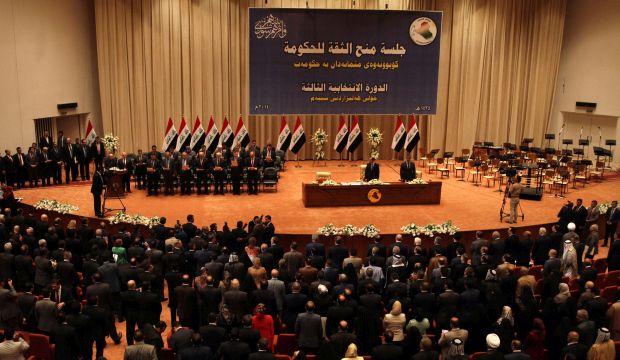
Members of the Iraqi parliament attend a parliamentary vote of confidence at the Iraqi parliament in Baghdad, Iraq, 08 September 2014. (EPA/Ali Abbas)
Baghdad, Asharq Al-Awsat—Iraqi lawmakers on Saturday approved the appointment of Khaled Al-Obeidi as Iraqi Defense Minister and Mohamed Al-Ghabban as Interior Minister, ending a political stalemate that had threatened to disrupt Prime Minister Haider Al-Abadi’s new government.
Obeidi, a Sunni MP from Mosul is a member of the Iraqi Forces Alliance and is said to be close to Iraqi Vice President and Mutahidoun Coalition leader Osama Al-Nujaifi. His appointment was approved by a vote of 175-85. While Ghabban is a Shi’ite lawmaker and member of Abadi’s own State of Law coalition—his appointment was approved by a vote of 197-63. The two ministers are expected to work closely together to confront the threat posed by the Islamic State of Iraqi and Syria (ISIS) which continues to advance across regions of Iraq despite intensifying airstrikes being carried out by a US-led international coalition against the group.
In comments to Asharq Al-Awsat, former interior ministry spokesman and security expert Abdulkarim Khalaf said that the two new ministers have not been appointed by proxy. “This will give them the strength and ability to work in a correct and sound manner on the condition that they do not fall subject to the will of their respective blocs.”
“The most important issue for the people of Iraq is for the performance of these two ministers to be monitored through regulatory institutions and pressure groups,” Khalaf said.
Iraq’s interior and defense ministerial portfolios had been vacant during former prime minister Nuri Al-Maliki’s administration. Maliki faced significant criticism at home and abroad for his government’s security record while the former prime minister himself served as acting interior and defense minister during this period.
Khalaf acknowledged that Obeidi and Ghabban will face a difficult challenge to address Iraq’s deteriorating security situation, calling on the two new ministers to appoint “competent officials to assist them, as well as to fight pre-existing financial and administrative corruption.”
He called on Iraq’s new defense and interior ministers to disarm militias and regulate popular mobilization against ISIS in order to “restore the prestige of the state and retake the three occupied provinces (Mosul, Salah Al-Din and Anbar.)”
The appointment of Obeidi and Ghabban took place on the same day that a number of key Kurdish ministers were sworn in. Former Iraqi Foreign Minister Hoshyar Zebari was sworn in as Finance Minister on Saturday while Bayan Nouri was sworn in as Minister for Women’s Affairs. In addition to this, Rowsch Shaways, a member of the Kurdistan Democratic Party (KDP) was also sworn in as Iraqi Deputy Prime Minister.
Kurdistan Alliance MP Ala Talabani told Asharq Al-Awsat: “The participation of Kurds in the government sends a reassuring message to our partners that we want to work together so long as what unites us outweighs what divides us. ISIS terrorist threatens everybody and so we need to work together to confront this.”
The Kurdish MP said that new Baghdad-Erbil talks will be launched in the coming period in order to resolve all outstanding issues between the two governments, including the payment of salaries to Kurdish civil servants and the allotment of the Kurdistan Region Government’s budget.
Newly-appointed Iraqi Minister of Culture, Faryad Rawandozi, also a Kurd, told Asharq Al-Awsat: “The presence of Kurdish ministers in the Iraqi cabinet will help enrich the discussions and result in cooperation towards solving a number of Kurdish issues including over the budget, oil, Peshmerga and security issues.”
Additional reporting by Dalshad Abdullah.

Trackbacks/Pingbacks